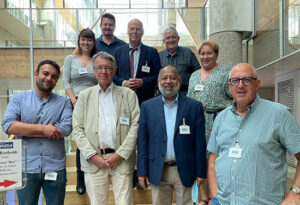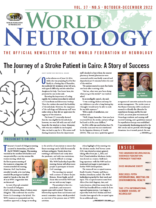Hybrid meeting Sept. 6-7, 2022, Strasbourg, France
By Christina Zjukovskaja, MSc, and Jacques Reis, MD, PhD
 This year’s meeting on environmental health took place over two days and in a hybrid format in order to allow active participation unencumbered by travel. Participants and speakers from all over the world were able to gather, report findings as well as discuss relevant topics. Day 1 included sessions on neurotoxicology, exposure science, and the clinical approach of exposure sciences. Day 2 included neurological impacts of climate change, health impacts of air pollution, long COVID as well as diseases and environmental risk factors.
This year’s meeting on environmental health took place over two days and in a hybrid format in order to allow active participation unencumbered by travel. Participants and speakers from all over the world were able to gather, report findings as well as discuss relevant topics. Day 1 included sessions on neurotoxicology, exposure science, and the clinical approach of exposure sciences. Day 2 included neurological impacts of climate change, health impacts of air pollution, long COVID as well as diseases and environmental risk factors.
The first day’s session on neurotoxicology started off with a look at animal models that both referenced the autism spectrum disorder and delved into the impact of red meat on neuroinflammation.
The exposure science session brought to light the indoor exposome and the current projects in the EU that are driving progress in the field. Also, surveillance of volatile organic compounds was discussed along with the ongoing attempts to connect the exposome and immunome.
The clinical approach of exposure sciences session introduced the audience to the extensive French network PREVENIR, which is used as a measure of prevention of reprotoxic exposure from the perspective of environmental and occupational hazards. This was followed by a thorough review of the new hypotheses surrounding environmental factors and amyotrophic lateral sclerosis. The session was closed with an engaging report on the experience of UPRISE, a course in Uppsala, Sweden, co-founded by RISE, that attempts to enlighten the young science and medical community about environmental health issues.
The second day’s session on neurological impacts of climate change introduced the audience to the issue of how human sleep is and will be further affected by a warmer climate. This was preceded by the topic of global warning and neurology and the impact of increasing temperature on neurological diseases. These topics were well complimented by the following lectures on multiple sclerosis and climate change as well as the perception of risk of ticks for Lyme disease.
The health impacts of air pollution session started with an in-depth look at air pollution and stroke, including direct and indirect affects, as well as its global burden. This was followed by a report on the short-term effects of air pollution on respiratory health using a time series. Finally, a comparison of the impact of first lockdown by COVID-19 in 2020 on the hospitalization rates of stroke and myocardial infraction in France debated and stipulated the cause of the drop in rates.
The long COVID session opened with reflections on the management of the pandemic. This was followed by several lectures on the impact of COVID on the brain and cognition. Along with long COVID and its impact, the pathogenesis and treatment of the neurological aspects were also discussed.
The concluding session, relating to diseases and environmental risk factors, delved deeper into the interdependent aspects of environmental impact on possibly overlooked health aspects. Along with brain and risk perception, vestibular function, balance, and dementia were all thoroughly discussed. Additionally, the hurdle of contamination dating back to inadequate World War I ammunition disposal and the issues within research in the intersection of the fields of neurodegenerative disease and environmental factors were reviewed and deliberated over.
With the conclusion of the Fifth International Meeting on Environmental Health, the audience was left with an appreciation of the work done the world over, the progress yet to be made, camaraderie, and the inspiration to reach new heights. This will undoubtedly help expedite the search for solutions to current and future environmental health challenges. •
